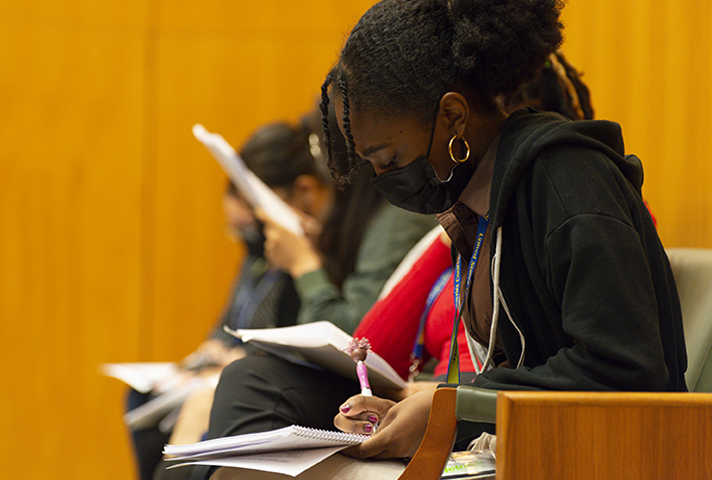As summer approaches, middle and high school students can choose from catalogues of camps that promise to improve everything from language skills to layup shots. Federal court camps prepare participants to be informed and engaged citizens in every walk of life, and at no cost.
“We view the summer camps at our federal courthouses in the Second Circuit as an incredible opportunity to allow high school students to explore the justice system in an interesting and interactive format, while at the same time equipping them with some basic advocacy skills and the self-confidence to pursue their dreams in whatever career path they ultimately choose,” said U.S. Second Circuit Judge Joseph F. Bianco, who created the first camp (link is external) of its kind in New York in 2016.
The initiative now is offered in multiple locations throughout New York and is one of a growing number of court camps across the country. At these interactive immersion programs, students observe and participate in the judicial process and gain legal and life skills from judges, lawyers, federal law enforcement agents and many other professionals who help the wheels of justice turn. Court camps benefit from partnerships in the legal community that bring together the courts, local bar associations, law schools, and law firms.

“Keeping camps free ensures that all students, regardless of socio-economic status, can be exposed to the justice system and find career paths in it,” said Bankruptcy Judge William J. Fisher, of the District of Minnesota, who is involved in a weeklong camp (link is external). “We hope students come away realizing that justice is for all and that there are many interesting diverse careers in the justice system.”
Group sizes and program lengths vary at each location, with some courts hosting from 10 to 100 students for a day, a week, or even several months in the summer. Each camp culminates in a mock trial, so that students can put their newly learned skills to the test. Programs also feature guest speakers representing a wide range of justice system careers, observations of live court proceedings, and lectures.
“Over the years, we have seen firsthand how this program not only furthers the Judiciary’s important mission of fostering civics in the next generation but can be a life-changing experience for so many students as they look to the future,” Bianco said.
The learning experience continues for many students well beyond the confines of the camp through mentoring and internship opportunities.
In Milwaukee’s Summer Youth Institute, students are paired with an attorney or judge mentor who is available to them as they pursue their academic and career goals after their camp experience. When they complete the program, students also are eligible for an internship which places them in a variety of settings in the legal community such as firms, judicial chambers, and the U.S. probation office.
“In addition to introducing students from all backgrounds to the various careers in the legal profession, the Summer Youth Institute enriches students’ understanding of the critical role of the courts in our democracy,” said Magistrate Judge Nancy Joseph, of the Eastern District of Wisconsin, who helps facilitate the program. “In this regard, we are not just preparing them for future careers in the law, but for their roles as responsible citizens.”
Court camps across the country include:
Connecticut & New York
- Warren W. Eginton Justice Institute in Hartford (link is external).
- Justice Institute: Crime, the Constitution, and the Courts in Brooklyn and Manhattan.
- Justice Institute: Crime, the Constitution, and the Courts in Central Islip (link is external).
- Contact justiceforall@ca2.uscourts.gov (link sends e-mail) for more information.
Louisiana
- Justice Camp in New Orleans (link is external).
- Contact fbaneworleans@gmail.com (link sends e-mail) for more information.
Minnesota
- Court Camp in Minneapolis (link is external).
- Contact CourtCamp@mnd.uscourts.gov (link sends e-mail) for more information.
Wisconsin
- Summer Youth Institute in Milwaukee (link is external).
- Contact SYI@marquette.edu (link sends e-mail) for more information.
To find educational court programs at the nearest federal courthouse, contact the federal courts’ national educational outreach manager Rebecca Fanning (link sends e-mail). Visit the educational resources section for additional programs and activities.
SOURCE: US COURTS
